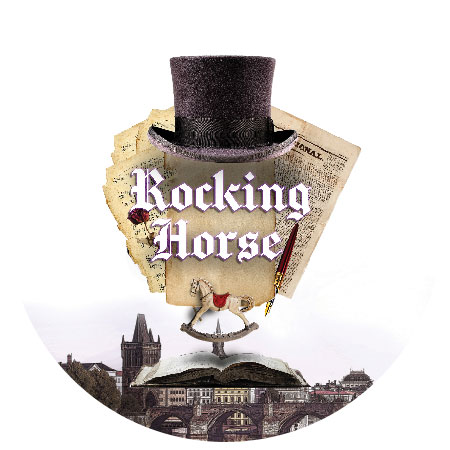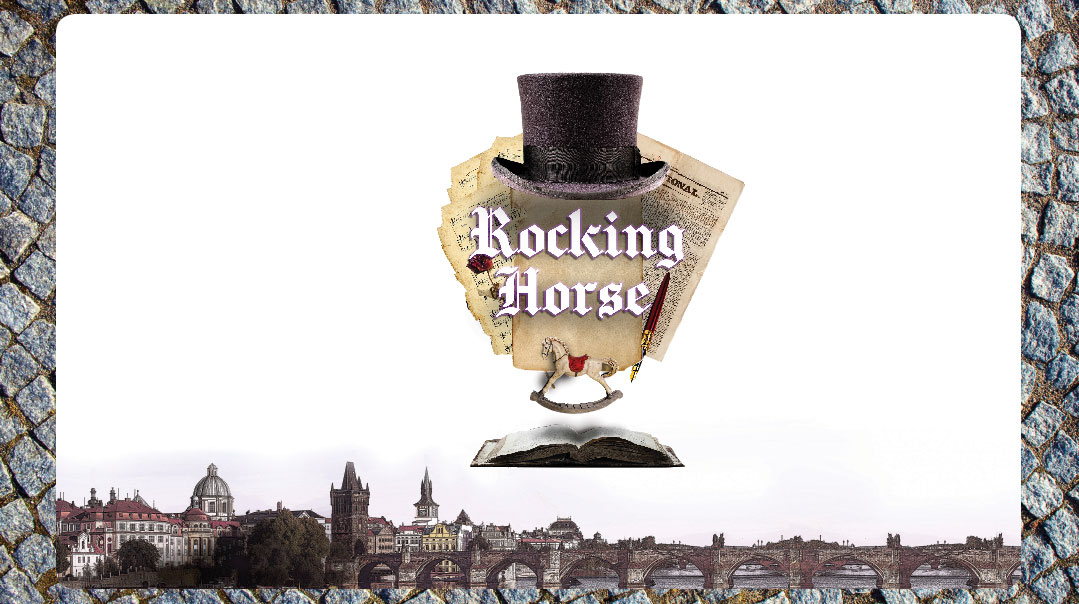Rocking Horse: Chapter 44

"He gave a sniff and told me that entertainment for its own sake is for people who do not value their souls”
S

Already Emmy has twice asked him for an explanation for a certain pensive look that, apparently, fell upon him in the late evening hours, and even hinted that it might be connected to a certain individual. He’d shrugged her off with what he hoped was nonchalance, tried not to protest too heavily.
But she was right. Every time his mind was not firmly distracted, it returned to Chasya. I am going to Eretz Yisrael.
How? Why? When? Really? Alone? But what about—
To the side, Felix, he orders himself sternly, put it all to the side.
“What are you doing?” Felix asks, with what he hopes is a hint of joviality.
Emmy is bent over a map that’s spread out on the dining-room table. He comes to stand behind her. Here and there, she has marked a red X. A ruler is in her hand, and she writes down her measurements on a piece of paper.
He jabs one of the X’s with his index finger. “What’s this?”
“A circus. That’s the one that sent the picture of the lady with this horse.”
“Aha. And the ruler?”
“I am measuring the distance.”
“Very scientific.”
He scans the map. “So all these X’s are traveling circuses?”
“More or less.”
“So many?”
She turns and looks up at him. “Seems like we have been quite deprived. They are quite the form of entertainment. They draw hundreds of spectators every evening.”
Felix thinks. “There was one in Prague a few years ago. I saw the advertisements and was fascinated — a picture of a man flying through the air. A trapeze artist, they are called. I begged Papa to take us.”
“And?”
“What do you think? If I remember correctly, he gave a sniff and told me that entertainment for its own sake is for people who do not value their souls.”
“Well, they certainly would not play Bach and Mozart from what I understand.”
“Exactly. And Mama said that circuses are a goyishe zach and no Yid would go to a circus. Pick your reason.”
Emmy laughs. “I shall reserve judgment until I have seen one myself.”
His eyebrows shoot up. “You shall go and see one?” He shakes his head. “Emmy, do you have to take things to the end?”
She nods and picks up the ruler once more. “Yes, indeed, it is my blessing and my curse.”
He sighs and sits down next to her. “So, what’s your plan?”
“We will travel by carriage to here.” She stabs an X with her index finger. “And from there, we can continue to here.” Another X. “And if Perla is not there, we shall continue on to Warsaw, from whence we can take the train home.”
“A costly trip.”
She is still bent over her map when she answers. “Life costs money.”
He bursts out laughing. “As if you know about that.”
She points to the oak sideboard. There’s an empty space where the bust of Goethe, the bust Joachim had gifted her, usually stands.
“I sold it.”
His eyebrows fly up.
“He was quite generous, Joachim. I got quite a lot of money for it. Mama hated it, anyway. That money will start us off. And I am sure that Papa, hearing this, will be willing to pay for the rest. I just need to wait until he’s had a good performance, and had a cup of wine, and I’m sure he will give me anything I ask for.”
Felix gives a dry cough. “I am quite sure he will.”
Emmy suddenly turns and looks him full on. “So, Felix, will you accompany us?”
He looks away. “I have things to do.”
“You would not want to leave Chasya.”
“It is not that.”
“You mean, it is not only that.”
“I sent a telegram to Becca.”
“A telegram?” Her jaw is slack and he wants to say, close it, be a lady.
He nods. “There is a girl there, I think some friend of hers, who ran away after being badly ill-treated. And I ordered her to send the girl home.”
“And so?”
How much should he tell her? She is innocent of the ways of the world. But then again, maybe not as innocent as she looks. “So I must be here when she arrives.”
“But Felix, why does this concern you so much? The girl will come home, be delivered back to her family. Someone will talk to them with fierceness about not entrusting their daughter to strangers, no matter how innocent they may seem. End of story.”
He keeps his face blank. She looks at him closely.
“You have another plan, do you not?”
He pretends to scrutinize the route to the circus.
A prod in the arm. He flinches. “Perhaps.”
“Go on.”
“The police superintendent said that there are many leads, but few witnesses, and without testimony, their hands are tied. If she returns and testifies, then we can lock up these people. Bring them to justice.”
“And what’s the other plan?”
He shakes his head. “Is that not enough?”
“Perhaps. But I’d like to know where Chasya fits into this.”
His hand bangs the table in frustration. Again, she’s prodding him where it hurts. “Why do you keep bringing Chasya into it? It’s about Becca and a poor girl who was shipped to Turkey whom we are trying to bring home.”
She gets up and paces the room, chewing on her lip. “By saving Becca’s friend, by bringing these men to justice, you are proving yourself to Chasya. Is that it? You are saying to her, See how I save Jewish girls? I deserve you.”
He does not answer, but his heart pounds and he wants to cover his ears with his hands like Leib’le does when they walk past a horse and carriage clattering across the cobblestones.
“Felix, there are easier ways of earning someone’s affection.”
She is merciless.
“And the first thing is simply taking your courage in your hand and talking to her. I find it quite comical, or ironic, or however you want to put it, that you will bring this case to the courts, and stand up in front of a judge, and accuse the thug who attacked you, but you cannot bring yourself to be open and honest with the woman who, quite unaccountably, has captured your heart.”
“You are running yourself ragged,” Fortuna remarks as she sets Becca’s plate in front of her. Becca looks at it. Fortuna is a wonderful cook, but now she is so tired that she feels queasy.
She half-heartedly picks up the spoon and shovels up something that looks like lamb.
“Where have you been today?”
Becca touches each finger as she counts. “Diamenta — some problem with little Rahel. Your neighbor, with the elderly mother-in-law, a lady by the shuk, just after birth—”
“And that girl from the shtetl.”
“Yes.”
She does not say this, but all her visits were perfunctory, just a look around a door, a stroke of a cheek, a smile and a warm cup of cinnamon tea. All so that she could rush to the Rosh Kahal’s home.
There, she coaxed Raizel out of bed, brought her a basin of warm water so that she could wash, and sat with her in the garden — green and lush even in the winter. There, she held Raizel’s hand and talked of nothings until she could coax some kind of reaction from the girl.
She wishes she could speak to Hannah. What did they do in that sanatorium in Vienna, where they healed women? Hannah had told her once that the women came there like shells, some barely uttering a word, others having fits of madness where they suddenly began thrashing and crying out. How did they soothe them?
“It is too much for you.”
“All I do is sit beside her and talk to her. It is hardly taxing. Diamenta makes me work three times as hard.”
Fortuna shakes her head. “Not your body. It is taxing your spirit.”
This is true. She thinks back to the Becca who thought she could conquer the world — move to Ottoman Turkey, set up a school, make enemies with Fortuna with barely a shrug of the shoulders. That girl has faded. She feels like a tired old woman.
Fortuna takes an envelope out of the pocket of her apron and hands it to Becca with a flourish.
The old Becca would have bridled. Who do you think you are to withhold this from me? It does not belong to you, it is not up to you to decide when and where to give it to me. Now she accepts it wordlessly.
She looks at the envelope. Printed along the top, in red block letters, is the word “Telegram.”
Her heart starts to thump. Tatte. Mamme. Wha— Shakily, she slits open the envelope.
Her eyes jump to the bottom of the typewritten page.
Felix.
Felix.
She lets out a breath.
“What is it? What’s wrong? Your skin has faded into white.”
“This is a telegram. Not just an ordinary letter. Words — a message — are said in a post office in Prague, and they are encoded — do you know what that means? No, well, do not worry about it. It is maybe like a gematria. Words that look like numbers.
“And then the numbers are sent along a telegraph wire. Even over the sea. I do not know how that works. Then the words are deciphered back from bangs or pips or squeaks of numbers, and they become words again.
“And then it arrives in my hand.”
Fortuna does not look impressed. “All that bother, letters, numbers, for what reason?”
“Because I hold in my hand a message, not from three weeks ago, but from two days ago, or perhaps three.”
Fortuna reaches out and touches the piece of paper. “It is like a miracle,” she says.
“Yes, it is. That is today’s world. A place where miracles are commonplace.”
“What does it say?” Fortuna peers over her shoulder.
Becca scans the printed message. Bring Home Girl. Go to Austrian Consul to Arrange Passage.
That was it. G-d bless Felix with his brevity. What does he mean by “bring”? Surely, he should have written “Send Girl Home.”
She lets out a deep breath and shakes her head.
“What?” Fortuna is itching to know.
“I wrote to him asking what to do with Raizel. And this was his reply.”
Fortuna waves her hands in the air, as if saying, Nuuuu.
“He said I should send — bring the girl home. To Europe.”
Fortuna looks at her with wide, dark eyes. “So you will be leaving us?”
Becca presses her palm against her forehead. Her mind whirls. The school. The people. Now, to travel back to Europe? And where would she go? Presumably, simply deliver the girl to her home and then return.
The director — what would he say? It feels like this decision is not her own to make.
And what of all the people here? Mothers and daughters and Nona, the tiny streets and surprisingly large courtyards, the honeysuckle and the buds that are already appearing on the pomegranate trees, although it is winter.
The classroom, where she goes once a week to sweep and dust, ready, ready for the classroom full of students, little girls poring over their primers, pencils in hand.
And Fortuna herself. They have a grudging friendship now. For weeks after she arrived, she’d lie in bed and imagine herself back in Paris. But now it feels like she’s being asked to step back into a dreamland, and she is not sure that she wants to do so.
to be continued…
(Originally featured in Family First, Issue 713)
Oops! We could not locate your form.


